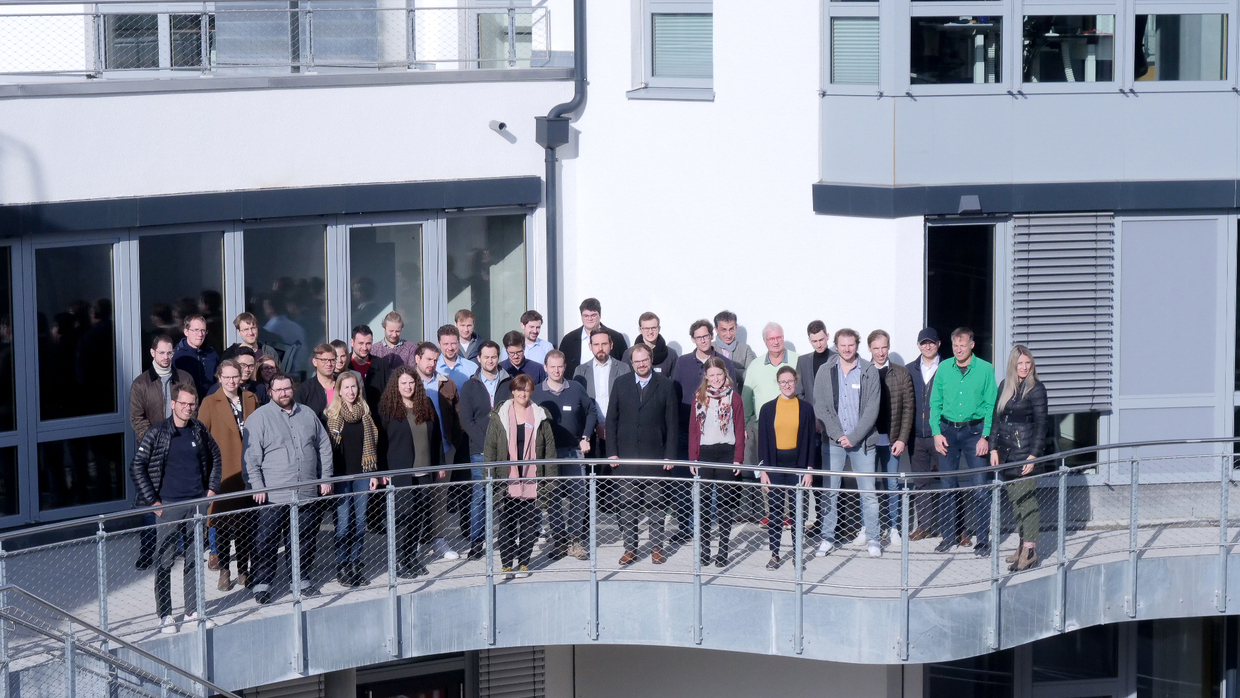First consortium meeting of the KARL project

On October 28 and 29, 2021, the KARL project leadership hosted the first consortium meeting since the joint kickoff in April. To make the exchange within the consortium Corona-friendly, the meeting took place in a hybrid format. About 40 participants were present at the Linder Technology Campus in the Karlsruhe Technology Park. Additional consortium participants were added online. In addition to the project partners, responsible persons from the project sponsor Karlsruhe and the Coco research project were also present or virtually connected in order to ensure networking with other competence centers. Two days of intensive work, workshops and lectures lie behind the participants.
“We started the project in the middle of the lockdown, which makes it especially nice to see what all the consortium partners have been able to put together within half a year.” says Prof. Dr. Steffen Kinkel from Karlsruhe University of Applied Sciences, who is leading the project. He said he was particularly proud that, despite the size of the project, there was quickly a sense of teamwork and the work was driven forward with high intensity in virtual meetings. “I am pleased that all partners are working on the project with high motivation. This is also due in particular to the heads of the design fields and use cases. These give a lot of focus to teamwork, both on a human and organizational level.”
Size and complexity - high intensity of work in the working groups
As one of several regional competence centers throughout Germany, the KARL research and development project is represented by its 20 partners in the Karlsruhe region. The consortium leader is Karlsruhe University of Applied Sciences. The goal of KARL is to make the impact of artificial intelligence (AI) on learning and work tangible and to shape change. In the process, people are at the center of all work. The Karlsruhe region with the national Digital Hub applied AI and the leading IT-cluster in Europe offers great development potential for this.
The first consortium meeting in presence since the joint virtual kickoff in April 2021 served on the one hand to enable the participants of the consortium to get to know each other better personally. On the other hand, to get an overview of the multi-faceted focus of all partners. Thus, on the first day, all participants were given an insight into what has been achieved so far in the focal areas of work. Despite the short project duration to date and Corona-related obstacles, progress has been remarkable. In the individual subject areas, requirements analyses were defined, stakeholder surveys were planned, data was sifted and, in some cases, initial demonstration models were created.
The lively exchange between the partners involved at the meeting proves how important it is to link the individual topics. Christoph Becker, head of department at the FZI Research Center for Information Technology, is jointly responsible for this in the project: “The cultures, languages and ways of thinking in science and business are in some cases very different. Only by defining clear goals we create a common understanding. Thus in KARL, the various disciplines also benefit from mutual exchange."
The second day was used to define the milestones for the coming six months and to tackle the next steps in a strengthened manner. “We at INIT are particularly enthusiastic about the verve and drive displayed in the project. The reason for this, in my opinion, is that the consortium is pulling in the same direction. Even though each partner is of course driving its own work forward, we want to help KARL as a whole to success.” says Dr. Roxana Hess, Product Manager MaaS at INIT.
Competence Center KARL - Artificial Intelligence for Working and Learning in the Region KARLsruhe
KARL is one of several regional competence centers investigating the impact of artificial intelligence (AI) on the world of learning and work. The goal of KARL is to design human-centered, transparent, AI-supported work and learning systems and to make them presentable in concrete practical applications. The Karlsruhe region with the national Digital Hub applied AI and the leading IT-cluster in Europe offers great development potential for this. The consortium leader is the Karlsruhe University of Applied Sciences. In addition to seven research and transfer partners, ten regional companies are also project partners. KARL is funded by the German Federal Ministry of Education and Research (BMBF) with almost eight million euros until 2025.

